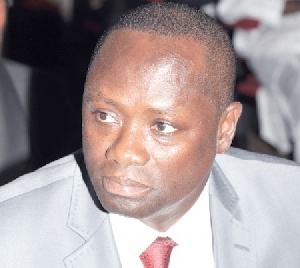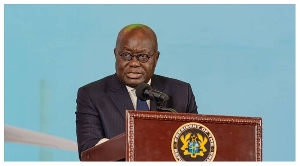Business News of Saturday, 20 September 2014
Source: B&FT
The 450MW power barges and matters arising
The week has witnessed a useful debate between the African Centre for Energy Policy (ACEP) and the Energy Ministry over the latter’s decision to contract a Turkish company to bring in two power barges (450megawatts) to augment power supply.
ACEP raised a number of concerns regarding the contract, including whether or not there are any safeguards for the Ghanaian public since the company bringing the power barges has had disputes with the governments of Pakistan and Lebanon, where it has undertaken similar projects.
The Energy Ministry took notice of the concerns and has in a press release signed by its Head of Communications, Edward Bawa, provided responses as follows:
ACEP: “Is the power supply arrangement for short- to medium-term or long-term? Given the uncertainties of technology and natural gas prices in the future, it will be preferable to have a short-term supply arrangement while the Government focuses on building land based long term power plants.
Ministry’s response: This particular power supply arrangement is a medium-term one (10 years). We note that in line with the objective of attaining 5,000MW installed generation capacity by 2016, various plants are under construction.
Others are also going through the necessary processes towards commencement. Government, noting the low water inflows into the hydro facilities and their implications on power supply for 2015, is being proactive by securing these barges as one of the many measures being taken in order to take care of the possible shortfalls in 2015.
ACEP: “Have independent Feasibility Studies (including EIA) been done on the two sites (Tema and Takoradi) by the Government or ECG? Or are the arrangements based on proposals and estimates by KKH? There may be serious potential cost implications for such a large project to be structured mainly on proposals by the power supplier in the absence of a Feasibility Study. If such studies have been done, would it not be helpful to have the reports available to the public?”
Ministry’s response: Karpowership, like any Independent Power Producer (IPP) that intends to operate in the country, needs to abide by the regulations in the sector. For that matter, any permit or licence required for the operation of a power plant must be obtained by the developer. Karpowership is therefore going through the process of obtaining all necessary permits and licences, just like any other power producer would have done in order to operate in the country.
As this is an emergency, government has formed a team of key regulatory and commercial stakeholders such as ECG, GRIDCo, PURC, Energy Commission, EPA, Ghana Maritime Authority, GPHA, etc., to facilitate and fast-track the licencing and permit process in order to meet the tight project deadlines
ACEP: “How is the project being procured? Has there been a transparent procurement process? Have other potential power ship operators been invited to submit proposals, or is it sole sourcing?”
Ministry’s response: The Ministry is at a loss as to what ACEP means by a transparent procurement process. Any IPP that comes into the sector looks for an off-taker. The off-taker negotiates a Power Purchase Agreement (PPA) with the producer on the tariffs. The PURC gives an indicative tariff based on the submission of technical and financial proposals by the developer. The off-taker then negotiates a tariff with the developer, using the indicative tariff given by the PURC. This is exactly what has been done in the case of Karpowership. The procurement process is therefore very transparent.
ACEP: “Who provides fuel for operating the powership? Is it the Ghana Government? If it is, do we have the budget or institutional arrangements for the supply of HFO (Heavy fuel Oil) for the purpose? ECG, as is currently structured, does not have that capability. If the fuel is to be provided by KKH, are they better-suited to manage the fuel risk than the government of Ghana?
For such large-scale transactions, one would expect government to procure the fuel since it can be included in the national portfolio of fuel imports and enjoy the economies of large procurement. More significantly, can’t government also secure fuel on better terms through Government to Government arrangements etc. (Pakistan and Lebanon supplied fuel under their respective contracts with KKH)?”
Ministry’s response: Under this arrangement, the fuel is being provided by the power producer.
ACEP: “Typical transactions of such nature involve escrows for the sale of energy produced, fuel, late payments etc. What is the size of such escrowed amounts? We understand that the Turkish company is demanding 4 months escrow for fuel, 4 months escrow for capacity and another US$50million upfront for mobilisation. The 2 escrows alone will amount to between US$170 and US$200million every 4 months.
Given ECG’s current financial position, the sizes of such escrows appear too large and would likely impose onerous financial difficulty on ECG. Logically, if Ghana can afford these, the question is: why can’t we apply these resources to build our plants over the next three years?”
Ministry’s response: We wish to provide the following clarification in answering this question: Under the monthly payment arrangement, power is consumed for one (1) month; Seller takes fifteen (15) days to submit an invoice to Buyer. Buyer has seventy five (75) days grace period to effect payment. This constitutes 120 days or four (4) months. It is equivalent to the four (4) months bill that is used in establishing the escrow account.
The US$50million guarantee is not expenditure; it is a guarantee to ensure that when the Seller, after taking bank loans, prepares the ship and sends it to Ghana, Buyer will not decide to abrogate the contract. The amount reduces by 10% per year of operation. It is not therefore the case that “the Turkish company is demanding 4 months escrow for fuel, 4 months escrow for capacity and another US$50million upfront for mobilisation”, and that “the 2 escrows alone will amount to between US$170 and US$200million every 4 months”.
ACEP: “If the Government of Ghana will be called to provide guarantees for ECG’s obligations, as is most likely, then has parliamentary approval been sought since it constitutes an international contract?”
Ministry’s response: At the moment, that is not the arrangement. Should there be need for government support the necessary approval would be sought. This is not a condition precedent for financial closure. It is rather a condition subsequent to operation of the plant.
ACEP:“What is the firm time-line for installing the powership in Ghana and operating it? The Minister alludes to Q1 and Q2 of next year. Is this a realistic target? Can all the associated infrastructural works such as preparation of the berthing area, grid interconnection etc. be completed by Q1 next year?”
Ministry’s response: In stating the time-lines for delivery of the power ship, the Hon Minister for Energy and Petroleum took into consideration all necessary preparatory work that needs to be undertaken, and he believes that per the project schedule the first and second phase of powership will be delivered in the first and second quarter of 2015 respectively.
ACEP: “What protection do we have in the contract for the public? It is to be noted that KKH has had disputes with the governments of Pakistan and Lebanon over administration of their power supply contract. Have we provided sufficient protection for ourselves regarding non-performance by KKH? Are the penalties adequate? How watertight are the obligations of KKH? Are the financial safeguards (Liquidated Damages etc.) adequate? In the Lebanese contract, the penalty for delays is US$270,000/day, while the penalty for not producing the contractual output of electricity is US$500,000/day for every 1% of production that falls below the agreed contractual level).”
Ministry’s response: Without trying to question the integrity of ACEP with regard to their data, it is a bit curious on the figures quoted and therefore the ministry will want to have more information on how these figures were arrived at. In the case of the Ghana project, the penalty for delay is US$135,000/day. Penalty for 1% output below the guaranteed level is US$36,654.57/day per powership, making it a total of US$73,309.14 for the full complement of the powership.
ACEP: “What is the size of the contract (in US$ terms?).”
Ministry’s response: This project is an IPP and therefore all investments toward the delivery of power are to be borne by the developer. The buyer’s responsibility is to pay for power delivered as per the agreed tariff.
In conclusion, the ministry agrees with ACEP when it states that in the interest of the public taxpayer there is a need to disclose details of the arrangement with Karpowership. That is what we have attempted to do. The Ministry wishes to assure ACEP and all civil society groups within the Energy Sector that its doors are always open, and going forward the ministry will continue to collaborate with all Ghanaians to ensure that we provide quality, reliable, sustainable and cost-effective energy services to all citizens.











